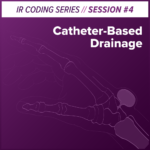I have two topics to cover today. First, let me start with criticism of an article I read wherein a healthcare executive was interviewed about reducing readmissions. This person said that to reduce readmissions, hospitals need to follow standards for length of stay. They then go on to discuss using the recommended length of stay, noting that exceeding it poses risks for patients, including falls, medication errors, and hospital-acquired infections.
I have never seen a table of recommended lengths of stay, so I have to presume they are referring to the geometric mean length of stay (GMLOS). And in no way should the GMLOS be considered the recommended length of stay. For Diagnosis-Related Group (DRG) 872, sepsis with a major complication or comorbidity (MCC), the GMLOS is 4.9 days. Are they suggesting that every such patient is recommended to be discharged on day 5, even if they are still encephalopathic, on pressors, and their creatinine is rising?
Please do not use the GMLOS as the right length of stay for every DRG. The right length of stay is when every day of their stay is a medically necessary hospital day.
On the positive side, to reduce readmissions, the article did recommend ensuring that patients can get their medications on discharge, have a follow-up appointment, and know who to call if there are questions or issues, to avoid having to go back to the hospital. Now, why didn’t we all think of those things?
Next, as we have mentioned in the past, the Centers for Medicare & Medicaid Services (CMS) is transitioning the short-stay audits to the Medicare Administrative Contractors (MACs) under their Targeted Probe-and-Educate (TPE) program, and they released a FAQ last week. As expected, I have some concerns. First, CMS refers to MCG Care Guidelines as “Milliman.” It has been called MCG since 2012. Perhaps we should start calling CMS with its old acronym, HCFA.
More significantly, they state that the MAC staff will not be using MCG or InterQual to make determinations, but clinical judgement. Whether “will not” is the same as “may not” is not clear, but suggestive of a prohibition. But the FAQ states that reviews will be performed by nurses with physician backup only for complex cases.
Now, I will defer to my nursing and legal colleagues, but I was under the impression that nursing licensure does not allow registered nurses (RNs) to make decisions based on their clinical judgement. Commercial criteria are a very helpful tool when used properly, and allowing nurses to use them for case screening (but not as a definitive reason for denial) is sensible. It remains to be seen how the MACs actually perform reviews; we will all be watching closely.
It is also interesting and concerning to note that under the current process, if Livanta intended to deny a short inpatient admission, you had an opportunity to discuss the case with them prior to an official denial being issued. Under TPE, if there are denied cases, you will be offered an education session from the MAC, but will have to formally appeal every denied admission, even if the MAC missed that the care began before midnight or the surgery was in fact on the Inpatient-Only List. Creating more work for providers is not something that anyone will be looking forward to.
In addition, in the CMS announcement, they once again confuse the need for inpatient admission and the need for hospital care. We all know that the basis of the rule is the determination that the patient is expected to require two midnight of necessary hospital care, yet the FAQ states they expect documentation to “support the need for services to be provided in an inpatient hospital setting.” There is absolutely no service that “needs the inpatient hospital setting.” Many services must be performed in a hospital for safety and regulatory reasons, but no hospital differentiates the medical care provided to inpatients and outpatients in the hospital. I certainly hope CMS clarifies that prior to the start of the audits.
EDITOR’S NOTE:
The opinions expressed in this article are solely those of the author and do not necessarily represent the views or opinions of MedLearn Media. We provide a platform for diverse perspectives, but the content and opinions expressed herein are the author’s own. MedLearn Media does not endorse or guarantee the accuracy of the information presented. Readers are encouraged to critically evaluate the content and conduct their own research. Any actions taken based on this article are at the reader’s own discretion.













